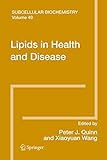Lipids in Health and Disease / edited by Peter J. Quinn, Xiaoyuan Wang.
Tipo de material: TextoSeries Subcellular Biochemistry ; 49Editor: Dordrecht : Springer Netherlands, 2008Descripción: recurso en líneaTipo de contenido:
TextoSeries Subcellular Biochemistry ; 49Editor: Dordrecht : Springer Netherlands, 2008Descripción: recurso en líneaTipo de contenido: - texto
- computadora
- recurso en línea
- 9781402088315
- R-RZ
Springer eBooks
Fatty Acids -- Transcriptional Regulation of Hepatic Fatty Acid Metabolism -- Modulation of Protein Function by Isoketals and Levuglandins -- Signalling Pathways Controlling Fatty Acid Desaturation -- Fatty Acid Amide Hydrolase: A Gate-Keeper of the Endocannabinoid System -- Modulation of Inflammatory Cytokines by Omega-3 Fatty Acids -- Eicosanoids in Tumor Progression and Metastasis -- Fatty Acid Synthase Activity in Tumor Cells -- Phospholipids -- Lipids in the Assembly of Membrane Proteins and Organization of Protein Supercomplexes: Implications for Lipid-linked Disorders -- Altered Lipid Metabolism in Brain Injury and Disorders -- Lysophospholipid Activation of G Protein-Coupled Receptors -- Phospholipid-Mediated Signaling and Heart Disease -- The Role of Phospholipid Oxidation Products in Inflammatory and Autoimmune Diseases -- Mediation of Apoptosis by Oxidized Phospholipids -- Sphingolipids -- Regulation of lipid metabolism by sphingolipids -- Multiple Roles for Sphingolipids in Steroid Hormone Biosynthesis -- Roles of Bioactive Sphingolipids in Cancer Biology and Therapeutics -- Glycosphingolipid Disorders of the Brain -- Role of Neutral Sphingomyelinases in Aging and Inflammation -- Sphingolipid Metabolizing Enzymes as Novel Therapeutic Targets -- Ceramide-Enriched Membrane Domains in Infectious Biology and Development -- Lipidomics -- MALDI-TOF MS Analysis of Lipids from Cells, Tissues and Body Fluids -- Lipidomics in diagnosis of lipidoses.
This volume gives an up-to-date account of the properties of the classes of lipids that are located in the membranes of all cells. These lipids form the essential structural components of the plasma membrane responsible for maintaining the distinct identity of the cell from its surroundings and mediating the flow of vital solutes into and out of the cell. The membrane lipids also represent reservoirs of signaling molecules that modulate a variety of physiological processes. The presentation gives a balanced perspective of what is currently known about the function of these lipids in healthy cells and tissues and what consequences follow malfunctions in their synthesis and metabolism.
Para consulta fuera de la UANL se requiere clave de acceso remoto.


